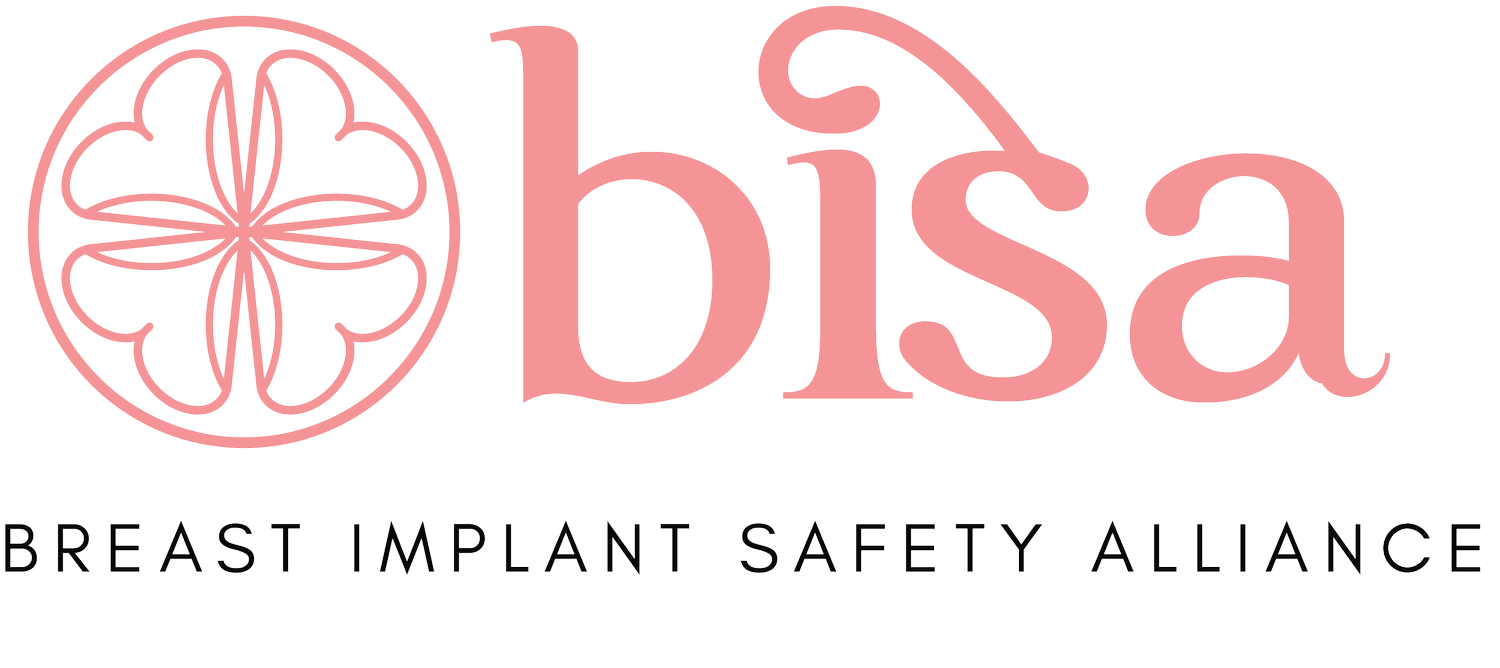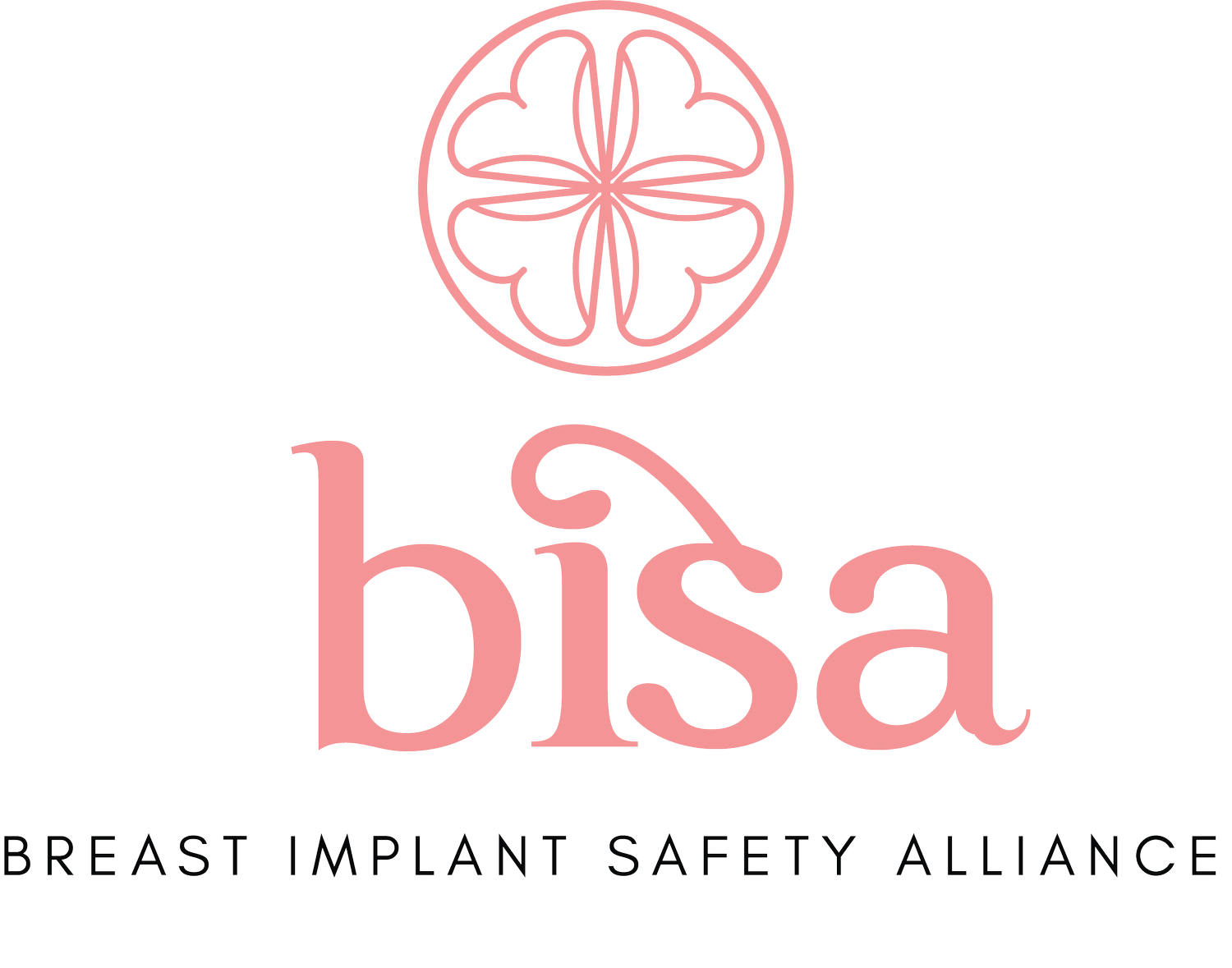BISA’s Recap of the FDA PEAC Meeting on Patient-Centered Informed Consent
Breast Implant Safety Alliance (BISA) team members attended the October 30, 2024, Patient Engagement Advisory Committee (PEAC) meeting on patient-centered informed consent in clinical studies of FDA-regulated medical products.
The meeting was attended by board members Maria Gmitro, Sarah Beckcom, Laura Willging, and advisor Madris Kinrad, a presenter. The meeting can be replayed on YouTube. More information and event materials can be found on the FDA’s website.
Why did we attend?
Patient-centered informed consent is an important topic for our team because, quite often, the informed consent documents can be too lengthy, confusing, and written with too much medical jargon. Breast implants and other breast devices are currently involved in clinical trials.
It was encouraging to see the FDA gather expert opinions and patient advocates and advisors to create better guidance on informed consent materials for potential patients who are considering participating in a clinical study.
The discussion focused on enhancing informed consent in clinical trials. Key points included the need for research literacy, a clear point of contact, and detailed post-trial considerations such as care, costs, and device maintenance. The importance of dynamic information sharing tailored to individual needs and the role of IRBs in standardization were highlighted. The committee emphasized the necessity of engaging with diverse populations, using multiple formats, and ensuring accessibility. They also stressed the importance of timing, location, and ongoing dialog to ensure participants understand trial participation's risks, benefits, and obligations.
The committee discussed the importance of transparent and informed patient consent in clinical trials. Points included the need for early, clear communication about trial procedures and technology, involving caregivers, and providing access to data for patients. Specific challenges highlighted were the complexity of informed consent documents, the need for accessible formats, and the importance of understanding data management and privacy. The committee emphasized the necessity of measuring and ensuring comprehension of informed consent, addressing ascent for minors, and considering future use of patient data. Patient experiences underscored the emotional and practical challenges of managing rare diseases and the importance of being seen and heard.
Here are just a few takeaways from some of the discussions & presentations:
Create shorter, easier-to-understand documents
Consider information literacy and write for an 8th-grade (average reading level) level or below
Put the most important information at the top
Incorporate the use of video with closed captioning
Incorporate more pictures and white space on documents
Emphasis on what will and what won’t be covered by insurance
Incorporate the use of UDI (a unique tracking code like a barcode) for any medical devices.
Use a mechanism for understanding, such as a quiz or asking questions to check for understanding.
Provide information on potential post-study needs so patients understand how a lack of support from study investigators after the trial could impact their health and finances. For instance, patients may need ongoing monitoring, device maintenance, or even device removal—all of which may require specialized expertise. If doctors with the necessary skills aren’t available through their insurance, paying out of pocket could be costly or even unattainable for those who can’t afford it. Additionally, even if insurance covers the expert care, travel costs to access it may still be prohibitive.
Informed Consent for Medical Devices
BISA’s data expert, and CEO of Device Events, Madris Kinard, was a public speaker who presented and highlighted the importance of informed consent, UDI tracking, and accurate adverse event reporting for medical devices in clinical trials and beyond. Her entire presentation can be viewed on the webcast at marker4:42:00.
Tracking Devices: Patients should get the UDI (a unique tracking code like a barcode) if a device is already on the market. This helps track recalls or issues. If certain devices (like staples or clips) might be used but aren’t 100% confirmed, patients should know upfront.
Allergies & Off-Label Use: Informed consent is a good time to discuss allergies or sensitivities, and if the device is being used “off-label” (not as originally intended), doctors need to make that clear since it could be why the study is happening.
Improving Reporting: Many adverse events with devices aren’t reported (only about 14%), so adding UDIs to records helps the FDA and improves tracking. The FDA has millions of reports in its MAUDE database, but patients often don’t connect later health issues to an implant if they’re not flagged by their surgeon.
What’s Needed Now?
UDI in Consent: The FDA should make UDIs a standard part of informed consent, and more public awareness (like for barcodes) would help patients, doctors, and hospitals understand UDIs.
Clear Device Details: Physicians should tell patients what’s in the device, if it’s MRI-safe, and what to expect if it fails.
Follow-Up Info: Patients need to know if future care is covered by the trial or insurance.
Ongoing Communication: Trials should encourage patients to share info with regular doctors post-trial—early communication is best.
FDA Update from November 4, 2024:
FDA is holding a virtual public webinar on Friday, November 8th from 2:00 pm – 3:00 pm ET on “Informed Consent – More than Just Another Document to Sign?” This event is hosted by the Office of the Chief Medical Officer’s Office of Clinical Policy and the Office of External Affairs’ Public Engagement Staff, both in the Office of the Commissioner.
Individuals who volunteer to participate in clinical research perform a critical role in advancing scientific knowledge. They also support the development of potentially life-saving therapies for patients who need better treatments. The research community has an ethical obligation to ensure that people understand the purpose and the potential risks and benefits of the research before they agree to join a trial.
This webinar will provide patients and researchers with an overview of FDA’s expectations for informed consent. The webinar will:
Give an update on FDA’s efforts to help improve informed consent materials so that they are more understandable for participants;
Recommend how informed consent can be presented in a clear, comprehensible way; and
Discuss how revised consent can help individuals make an informed decision on whether to join a clinical trial.
Registration:
This event is free and open to the public. However, registration is required and open until the meeting starts.
Date: Friday, November 8th, 2024
Time: 2:00 PM – 3:00 PM ET
Location: The webinar will be held via Zoom.
Ask Us a Question: Registrants can submit questions for speakers on the registration page and during the event.
RESOURCES
Informed Consent – More than Just Another Document to Sign? FDA Webinar November 8, 2024
BISA Speaks at Session, Meets with FAS to Improve FDA Advisory Committees
FDA: Patient Engagement Advisory Committee (PEAC) Meeting: Patient-Centered Informed Consent in Clinical Study of FDA-Regulated Medical Products on October 30, 2024
FDA: Advisory Committees Give FDA Critical Advice and the Public a Voice
Federation of American Scientists
Learn About FDA Advisory Committees
The Future Of FDA Advisory Committees: Protecting Public Health And Preserving Public Trust
Device Events
About Breast Implant Safety Alliance (BISA)
The Breast Implant Safety Alliance (BISA) is the largest organization of board-certified patient advocates and subject matter experts in the world dedicated to patient and consumer safety relating to breast implants. Representing the millions of individuals worldwide that currently have, had, or are considering breast implants, the alliance is a non-industry funded leading authority dedicated to providing balanced, evidence-based information for informed decision making about breast implant surgery and related issues. Founded in 2019 by women, BISA is a grassroots nonprofit organization led by volunteers who do not receive a salary for their work.
Contact: Maria Gmitro, President | maria@bisanonprofit.org


